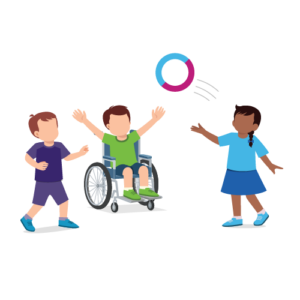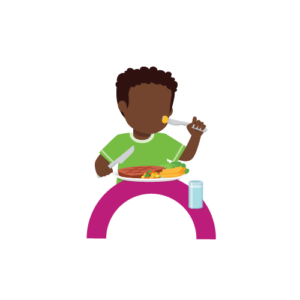 Starting school is a big step. There are some steps you can take to help your child settle in and feel confident in this new chapter of their lives. There will be help for your child at school, if they need it, with toileting, dressing and meal times but helping them do this themselves without help will boost their self-esteem and confidence. Take small steps at first. Praise and encourage your child throughout and give them enough time to practise. Your health visitor can offer guidance and support if you would like support to help your child reach these steps.
Starting school is a big step. There are some steps you can take to help your child settle in and feel confident in this new chapter of their lives. There will be help for your child at school, if they need it, with toileting, dressing and meal times but helping them do this themselves without help will boost their self-esteem and confidence. Take small steps at first. Praise and encourage your child throughout and give them enough time to practise. Your health visitor can offer guidance and support if you would like support to help your child reach these steps.
Your child:
- is happy to be away from you for periods of time in the day
- can wipe their nose, go to the toilet, wipe themselves, and flush without any help
- can ask for help if they feel unsure or not well
- can recognise their own name written down
- can use a knife and fork and open their lunch by themselves
- put their uniform on and take it off again. Use easy fastening shoes and clothes to begin with
- is used to their new morning routines, including getting dressed and eating breakfast
- is used to playing with and sharing with other children
- has a good bedtime routine so they're not tired at school
- has had their all their pre-school vaccinations including their first and second dose MMR vaccination to protect them against measles, mumps and rubella. The MMR vaccine is a safe and effective combined vaccine. Contact your GP to book any vaccinations needed.
Listen to your child’s worries if they have any. Reassure them you understand with phrases like “I know you’re a bit worried” and tell them you'll miss them too. You could try talking about your time at school, you could show them some of your old school photos; you can read books together about starting school, visit the library and see what you can borrow for free. Together, come up with some situations they can look forward to, such as being with their friends, meeting their new teacher and learning new things. A nice tip is to draw a heart on their wrist and one on yours too. If they are missing you they can press the heart and know that you will feel it. Tell them you’ll press yours too.
Watch the video below to find more ways to help your child prepare for school.
 Healthy habits
Healthy habits
This is a special time in your child’s life. Make it the start of a pattern of good habits to be carried into adult life including regular mealtimes, healthy snacks, and taking time to be active. Visit our keeping your child healthy section for more support.
Apply for free school meals
Apply for free school meals if you’re eligible. Although all children are entitled to a free lunch in key stage one (reception, year one and two), around 20 per cent of children are entitled to be registered for ‘free school meals.’ If eligible, the school can access up to £8,310 in additional funding.
Vaccinations
 Your child will be offered the flu vaccine between September and December at school. This is completely painless - just a gentle squirt up the nose. You’ll be contacted by your child’s school with details about how to give consent online. Your child will be learning and playing with more children when they start and could be at risk of catching preventable diseases if they have missed any of their childhood immunisations. Check your child’s Red Book or ring your GP if you are unsure if they’ve missed any vaccinations.
Your child will be offered the flu vaccine between September and December at school. This is completely painless - just a gentle squirt up the nose. You’ll be contacted by your child’s school with details about how to give consent online. Your child will be learning and playing with more children when they start and could be at risk of catching preventable diseases if they have missed any of their childhood immunisations. Check your child’s Red Book or ring your GP if you are unsure if they’ve missed any vaccinations.
Families who might need further support
All children are unique and will develop at different rates often without anything for parents to worry about.
Some children and young people may require more help to learn and develop than others of the same age because of a physical disability, neurodivergence or a learning need. They may be classed as having special educational needs or disability (SEND) and they may get extra support.
The first step is to talk to your child's education setting to share any concerns you have and discuss the support that can be put in place for them. You can find a video about what support is available and who to speak to if you think your child has SEND needs. Contact your child's school before they start to get that support in place for them as early as possible. With that extra support children will make good progress.
Starting school is a big step and our service is here to help. We provide advice, support and help on a variety of health issues and will refer to specialist services, when needed. Find out more the support available to you from the Kent School Health Service in the video below.
Useful resources
- Download the Born to Move app for more tips, activities and resources to support you and your child.
- Pacey and BBC Bitesize have lots of fun activities to help give children the confidence and skills to enjoy their first year at school.